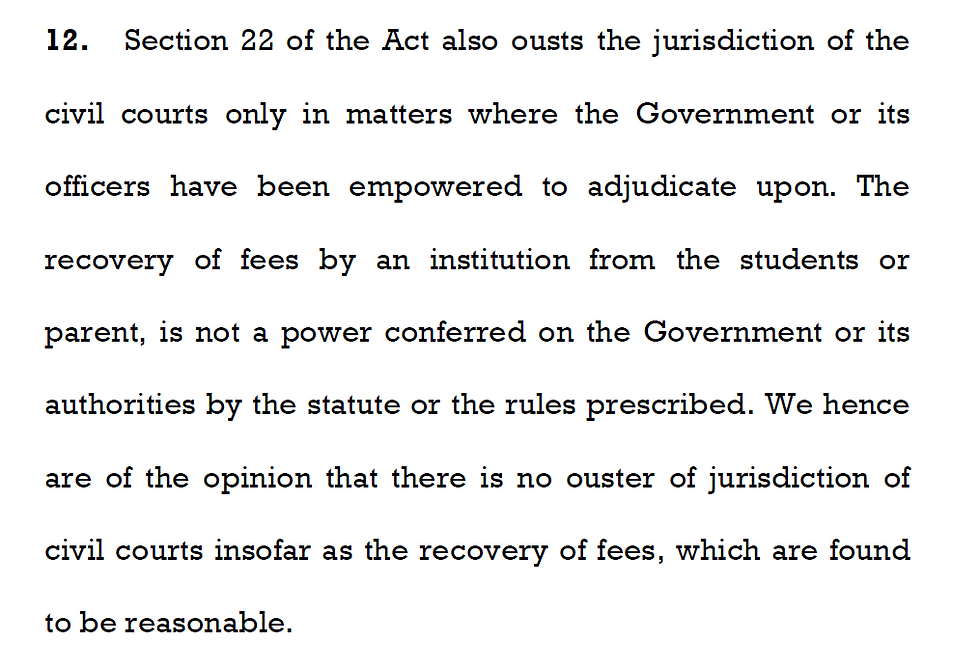Top Court Upholds Civil Court Jurisdiction in School Fee Recovery Dispute
- M.R Mishra

- Aug 5, 2025
- 3 min read
Updated: Aug 7, 2025
In a significant verdict balancing the autonomy of unaided private schools and the rights of students, the Supreme Court has clarified that civil courts retain jurisdiction over fee recovery disputes, despite regulatory mechanisms like the Fee and Fund Regulatory Committee (FFRC) established under the Haryana School Education Rules.
What's The Matter?
The case, involving Apeejay School, underscores that schools are entitled to enforce lawful fee hikes subject to regulatory scrutiny and that no blanket bar exists on approaching civil courts.
The controversy dated back to the academic year 2009–10, when the school notified a fee hike, which the students’ parents opposed, continuing to pay only the old fee amounts.
While the school allowed the students to continue their studies uninterrupted, the unpaid portion led to a series of suits for recovery of dues. These suits were initially decreed by trial courts, and partially upheld on appeal with some modifications, including a reduced interest rate.
What Court said?
However, the Punjab and Haryana High Court later intervened, holding that the FFRC had exclusive jurisdiction in fee hike disputes, effectively ousting civil courts from such matters. This position was struck down by the Supreme Court, which restored the trial court decrees, thereby reaffirming the enforceability of valid fee structures by schools, even through civil suits.
Crucially, the Court found that Section 22 of the Haryana School Education Act, 1995, which bars civil courts from adjudicating matters assigned to the Government or its officers, did not extend to private schools’ claims for recovery of fees.

Since the Act and Rules do not empower government authorities to adjudicate recovery claims by schools, the door to civil litigation remains open in such matters.
While the FFRC established under the 2014 amendments to the Haryana Rules does provide a forum for parents or students to challenge arbitrary or excessive fees, the Court clarified that schools themselves have no reciprocal forum to seek enforcement of their notified fees. As a result, resorting to the civil court is not barred, and in fact necessary, when students fail to pay without first challenging the hike through the FFRC.
Interestingly, no parent or student in this case had actually approached the FFRC, despite the option being available. In the meantime, the school had continued to provide education services, and the suits were filed only after the State’s appeal against a previous judgment on fee regulation was withdrawn thereby giving rise to a clear cause of action.
The Court also addressed procedural fairness. It held that while the FFRC retains the power to examine excessive fees, any refund obligation must be limited to the extent of fee hike disallowed, not the entire amount.
The appellate court’s earlier direction to refund all fees if the FFRC ruled in favour of students was deemed erroneous and corrected accordingly.
This ruling not only restores the trial court’s decree in favour of the school but also safeguards the legal route for educational institutions to recover fees, unless found excessive by competent forums. It also reinforces the principle that regulatory oversight and judicial enforcement are not mutually exclusive particularly where no effective remedy is available to one party.
At a time when educational finance is under greater scrutiny, this decision sends a clear signal: regulatory compliance cannot become a barrier to rightful dues. Schools, while accountable, also have a legal footing — and when students benefit from services already delivered, they cannot escape liability simply by challenging the system ex post facto.
Disclaimer:This blog is for informational and Educational purposes only and does not constitute legal advice. For specific legal concerns, please consult a qualified professional.







Comments